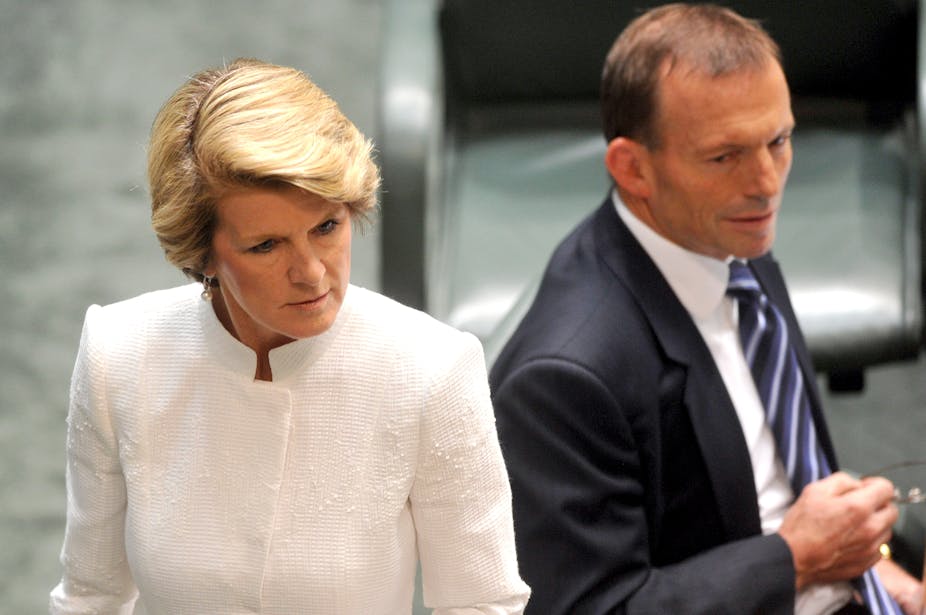In his budget reply speech last week, opposition leader Tony Abbott said Indonesia was to be a “vital partner in Australia’s future”.
He’s right, and for now, at the government-to-government level, Australia-Indonesia relations are reportedly at an all-time high according to the Indonesian Embassy in Canberra in the latest edition of Diplomasi.
But the recent statements by Tony Abbott and Julie Bishop – admittedly not (yet) in government – could hurt our relationship with Jakarta.
Rocking the boat
Abbott has recently announced three things. First, he would go to Jakarta in his first week as Prime Minister to advise Indonesia that his government would turn asylum-seeker boats back to Indonesia.
Second, he would tell Indonesia that he regards people smugglers with the same seriousness as Indonesia regards drug smugglers.
And third, he committed to a greater focus on foreign, particularly Asian language learning for pre-school aged children and above.
The first two announcements are not likely to serve Australia’s interests and responsibilities in the region.
The policy on returning boats is, of course, not a new one. The opposition leader has been repeating this statement for some time now. Indonesia can hardly have been unaware of what he says he will do if he becomes prime minister.
What is new is to say that in the first week in office he would go to Jakarta to make this policy clear to the Indonesian government. The Indonesians are thus on notice that they can expect a lecture from Mr Abbott on his asylum-seeker policy within days of his coming to office.
The Indonesian authorities will be surprised that this issue is of such importance to Australia. Are they to assume that Australia under Mr Abbott’s leadership would be such a fragile nation that it would fracture if the issue is not dealt with this rapidly?
Or might they conclude, as suggested by one Indonesian parliamentarian Julie Bishop met with recently, that Abbott’s sense of urgency rests on economic factors: that Australians are worried that their standard of living is being threatened by asylum-seekers, and that any delay in sending them back would reduce their incomes?
Either way, Abbott might well find that a variety of people he wants to meet on that first visit to Jakarta are unavailable. Visitors always run that risk when they turn up on your doorstep uninvited, as the opposition leader’s own policy illustrates.
Crime and punishment
The second Abbott statement – that he regards people smugglers in the same way Indonesians regards drug smugglers – is maladroit, to say the least.
First, Mr Abbott’s statement is simply wrong – unless, of course, he means to imply that under his leadership Australia would impose life sentences, or even the death penalty, on those bringing asylum seekers to Australia. I cannot believe that this is so. Nor, I suspect, do the Indonesians think it is either.
Moreover, the underlying issues are different. It is illegal to use drugs into Indonesia, while it is not illegal to seek asylum in Australia. True, Mr Abbott was referring to the people who bring drugs and asylum seekers into the country: their actions are illegal in both countries. But to suggest moral equivalence between these two actions without looking at their effects is perverse.
I doubt whether many in Indonesia take Abbott’s views on this issue seriously.
Cause and effect
But what is the intended outcome of these statements?
Abbott offers no insights into what he expects Indonesia to do with the asylum seekers returned to their territory. Given it is not a signatory to the 1951 Refugee Convention, and faces difficulties providing for the everyday needs of its 240 million citizens, Indonesia is hardly likely to offer them refuge. Nor is it likely that they will be returned to their countries of origin.
More likely, they will sit in cramped, increasingly over-crowded immigration detention centres until such time as they can escape – and find a boat to make another attempt to reach Australia.
In other words, Australia achieves nothing from this policy, except straining the relationship with Indonesia.
And this is why Mr Abbott’s approach is bad policy: it does not serve Australia’s interests.
We need to recognise that the asylum seeker issue is not Australia’s alone to deal with or to resolve. Other countries are affected too, not the least of which is Indonesia.
We need to collaborate with the Indonesians in trying to resolve this issue, not confront them. That’s not pandering to Jakarta; it’s simply good public policy for Australia.

